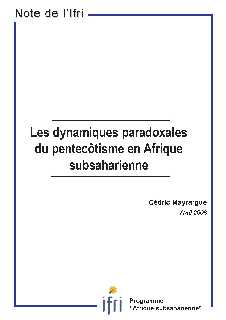The Financial Challenges of the Sub-Saharan Africa Telecoms Boom

Telecom industry has taken a significant place within of the economy of most African countries. In this aspect, it is an undeniable source of economic growth and development. It impacts on the financial sphere at three levels.
Firstly, telecom industry in African countries plays a considerable part within capital flow themselves: from mobile-payment to international money transfer, impacts are numerous. Furthermore, private telecommunications companies are often the most important fiscal contributors, rising many questions about economic issues for African governments. Finally, there is the setting up of a speculative telecom bubble in Africa with an important rise in value of licences or private telecomunications companies; a bubble which is probably going to face difficulties when some companies are going to struggle reimbursing their debts. The analysis of these three phenomena illustrates key challenges for this industry within the coming years.
This paper is a translation from a note published in French on Ifri's website in February 2010: Les enjeux financiers de l'explosion des télécoms en Afrique subsaharienne
Henri Tcheng is Partner at Cabinet BearingPoint in charge of Telecoms for Europe, Africa and Middle-East, Jean-Michel Huet is Senior Manager in the same team and Mouna Romdhane, consultant.

Available in:
Regions and themes
ISBN / ISSN
Share
Download the full analysis
This page contains only a summary of our work. If you would like to have access to all the information from our research on the subject, you can download the full version in PDF format.
The Financial Challenges of the Sub-Saharan Africa Telecoms Boom
Related centers and programs
Discover our other research centers and programsFind out more
Discover all our analysesAnglo-Kenyan Relations (1920-2024) : Conflict, Alliance and a Redemptive Arc
This article provides an evidentiary basis for postcolonial policy in its analysis of Anglo-Kenyan relations in a decolonization era.
When City Diplomacy Meets Geopolitics: A Framework to Help Cities Navigate Geopolitical Risk
Crises and the increasing polarization of international relations make political risk analysis an indispensable resource for internationally active public and private entities.
The United Nations Mission in Congo or the exemplary uselessness of the United Nations peacekeepers
During the M23 conflict in 2012-2013 in the Democratic Republic of Congo (DRC), the United Nations (UN) took the diplomatic initiative (by initiating the Addis Ababa agreement) and the military initiative (by launching a coordinated counter-offensive with the Congolese army). Since the resurgence of this conflict in 2022, the United Nations, which still has more than 10,000 peacekeepers deployed in eastern DRC, no longer plays any role.
Rebooting Italy's Africa Policy: Making the Mattei Plan Work
Against the backdrop of increasing anti-French rhetoric across parts of Francophone Africa, the relative failure of the counterinsurgency operation in the central Sahel (Operation Barkhane) and diplomatic rifts with several Sahelian countries, Paris has been rethinking its relationship with the continent for several years now. As a former imperial power that has seen its colonial domain in Africa gain independence between 1956 (Morocco-Tunisia) and 1977 (Djibouti), France has invented two successive roles for itself in Africa since 1960, particularly in French-speaking sub-Saharan Africa.








